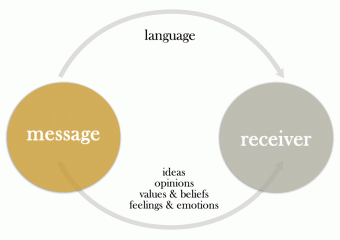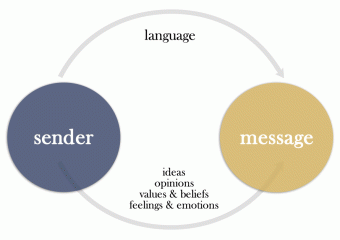Do you wish to improve your communication skills? I have explained, in detail, the components of communication and how they affect it. Successful communication depends fundamentally on how well a person knows themselves, their audience or the person whom is addressed, and the competency to communicate what they mean. In this article, I will introduce a tool which is quite well-known among communication experts and coaches. Using the Johari window, you can raise your level of self-awareness. If put into practice among colleagues and teams, it can help develop mutual trust and facilitate communication.
The famous four quadrant window, the Johari Window, can be used as a complementary tool with communication components discussed before. To refresh your memory, communication components are the message, the sender, and the receiver of that message. I also explained that various characteristics of the sender and the receiver can affect communication, intentionally or otherwise. A skillful communicator knows themselves and their purpose as well as the receiver of the message. The use of Joseph Luft and Harrington Ingham’s Window will help you better understand how the components of communication work. Moreover, it improves how you navigate them to achieve successful communication and maintain the quality.
The Johari window is based on two main concepts: how much I know myself, and how much others know me. A team, group, or an organization can build trust and improve communication using the Johari window. Based on what you or others may or may not know about you, there will be four quadrants or panes indicating that knowledge.

Open Area
The first pane contains what is known to you and to others. In other words, it is the aspect of you that you know well and you share it with others. The purpose of this tool is to help enhance this particular pane and reduce what is not known to you and others. This is where self-awareness becomes vital. To tactfully communicate feelings, emotions, beliefs, values, opinions, and many other information, one needs to be aware of them and be able to control them first. This knowledge can come from self-discovery or from others communicating what they see about you that you may not have been aware of before.
Blind Spot
Another possibility is that there are certain characteristics, attitudes, or behaviors of which others are aware, yet you have not yet realized that they exist. It is not uncommon for a person to consider themselves as having certain qualities and reject others. Every person has a specific opinion about who they are, and this may affect how they see themselves. The ideal self-image can distort the reality to the point where a person may deny behaving or feeling a certain way. Allowing others or even better, asking others for feedback, can help reduce the second area which is appropriately called the blind area of the Johari window. You can get back your sight; all you need to do is ask.
Hidden Area
The third quadrant of the Johari window, which exists in every person, is called facade or hidden area. This aspect is not only useful, but sometimes even necessary. This concept is similar to another well-known concept called persona. As a member of the society, we need to conform and adapt, therefore, we may keep hidden certain aspects of our personality, beliefs, opinions, and even emotions and feelings. As practical as it can be, it can also become a threat, not only to the integrity and true identity of the person, but also to their relationships. In a place where a person can feel safe to be themselves, persona can and should be replaced with the true self. Self-disclosure or exposure can lead to a smaller hidden area and enhance the arena.
The Unknown
The last pane of the Johari window belongs to those aspects of ourselves which are unknown, both to us and to others. We, and sometimes, the people around us are surprised by changes in our behavior, self-expression, beliefs, and even values. These changes do not happen overnight, but personality evolves and develops depending on your developmental stage and the life experiences. These changes may be first noticed by others, or you can become aware of them, depending on your level of metacognition, insight, and self-awareness. The process of knowing the unknown can involve others. It may also be an experience shared by others or a solitary path to self-discovery.
Conclusion
Every person has to go through phases of life, alone or with others. Self-awareness and insight enables you to understand the deep values and motivations that lead you to behave a certain way, while allowing you to become more creative with your actions and options under different circumstances. It also helps better communicate with others, create a more trusting environment, and better maintain relationships. The Johari window can help develop all our aspects of emotional intelligence: self-awareness, self-control, social awareness, and relationship management.





